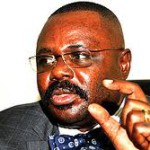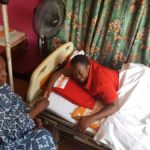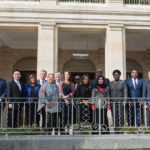Below is the Deputy Speaker of Parliament Jacob Oulanyah’s explanation to the European Union Parliament sitting in Brussels on Monday about the just concluded 18th February election.
Thank you Honorable Chair, for giving my delegation an opportunity to participate in this meeting and dialogue with the Honorable Members of the European Parliament.
The Republic of Uganda welcomes dialogue, respect and understanding with the European Union on matters of mutual interest. Regarding the reports being considered by this Committee, my delegation submits the following.
The Electoral Commission of the Republic of Uganda endeavored to prepare a conducive environment to allow for Ugandan voters to participate in the elections held in February and March 2016.
As a young democracy, Uganda as a whole and its institutions are evolving into a stronger and more vibrant democratic nation. Uganda has been undertaking electoral reforms to improve democracy. Most laws on elections have been amended after every cycle of elections to enhance transparency and accountability.
Civil and political rights are guaranteed in the Bill of Rights and the obligations and rights of citizens are further provided in the relevant laws.
In 2005 Ugandans by referendum adopted a Multiparty System of Government as a key addition to holding of regular free and fair elections with constitutional guarantees of the rights of the individual, and separation of powers between the governing party and the three arms of Government (the Executive, the Legislature and the Judiciary).
The Presidential, Parliamentary and Local Council elections laws provide for equitable conditions for all candidates except that the incumbent President has entitlements of the office. The Electoral Commission has the obligation to ensure compliance.
There is continuous discourse between government, political parties and civil society regarding electoral reforms.
The Parliament has the mandate to amend the relevant laws after consensus is reached. Several amendments were undertaken by the Parliament in 2015 prior to the elections of 2016, for example; The Presidential Elections (Amendment Act) No.14 of 2015, The Parliamentary Elections (Amendment) Act No.15 of 2015, The Local Governments (Amendment) Act No.16 of 2015, The National Council For Older Persons (Amendment) Act No.18 of 2015, The National Council For Disability (Amendment) Act No. 19 of 2015 and The National Youth Council (Amendment) Act No. 20 of 2015.
The 18 February 2016 elections were organized in accordance with the laws of Uganda, and were peaceful, free and fair.
However as a developing country a number of un-intended logistical challenges were experienced including late delivery of materials.
In such cases, the Electoral Commission officially apologized and undertook to provide remedies which included extension of the voting time from the statutorily provided time of 16:00 hrs to 19:00 hrs.
It also extended the voting date to the 19th of February in affected areas like Kampala to allow everyone in the queue and those who had not voted to vote.
H.E. President Yoweri Museveni of the National Resistance Movement (NRM) emerged as the winner of the 2016 Presidential Election for a 5-year term, having obtained 60.7% of the total votes cast and the runner-up obtained 35.37%.
We welcome the commendations from Election Observer Missions for example the Commonwealth Observer Group, which commended the Electoral Commission for extending the voting hours.
In the interest of national security which is a legitimate public interest as provided for under the Constitution of the Republic of Uganda in particular Article 29 Clause (1) and Article 43, Clause (1), the Government has a duty and obligation to protect the population and their property by stopping danger to the public.
It should be recalled the significant role that hate media played in a neighboring country. Due to credible information that people were planning to misuse social media to cause violence, mayhem and disruption, all measures were taken to ensure protection of Ugandans including the temporary restriction of social media which is a form of broadcasting, falls under the definition of communications, and is carried over communications channels operated by licensed providers.
Until this threat was established, there was widespread uninterrupted use of social media. The Uganda Communications Commission which has subject matter jurisdiction over all electronic and social media as well as regulatory jurisdiction over licensed providers of communications services, acted in accordance with Section 31 of 2013 Communications Act in order to address the difficulties presented to enforcement of content verification related to national security, and jurisdictional limitations with regard to the people inciting criminal activity.
Uganda is one of the countries where freedom of the press and the media is at the highest levels, and is guaranteed by The Constitution of The Republic of Uganda under Article 29 (1) (a).
There are over 24 daily and weekly newspapers, 26 free to air and 5 pay TV stations, as well as 220 licensed and operational radio stations countrywide.
The media environment is highly pluralistic in Uganda and private sector driven. The Government does neither exercise editorial, content supervision nor censorship and did not do so during the concluded elections.
The Media in Uganda primarily operates under the legal framework of, The Press and Journalist Statute, 1995 (PJS), The Electronic Media Statute, 1996 (EMS) and The Uganda Communications Act, 1997 (UCA) that deals with licensing electronic media. In these statutes, Press and Journalist Statute Section 3 and Electronic Media Statute Section 8, the right to publish or broadcast any content, without undue hindrance, is guaranteed.
The Uganda Police Force (UPF) has a responsibility for law enforcement, property protection, crime prevention, and public order. Within the police force Crime Preventers have existed for a long time and have increased in number.
Crime prevention has been an integral part of Community Policing which since its introduction into the Police Force in 1989 has become popular and gained clarity.
Crime preventers are not a militia but citizens who have volunteered to actively promote peace and stability in Ugandan communities.
They fall under a clear legal framework and due to a high response of volunteers the Government has prepared a Memorandum for the Cabinet to consider with the aim of authorizing a policy and bill to manage them.
It was in October 2014 when the Uganda Police Force celebrated 100 years of existence that the Police witnessed unprecedented large numbers of volunteers joining as crime preventers. The Constitution of the Republic of Uganda provides under Article 212 that the Police are enjoined to cooperate with the Civilian authority and other security organs and with the population generally.
It is in furtherance of this mandate and the national objectives and directive principles of state policy under the Constitution which require all State organs and the people of Uganda to work towards the promotion of national unity, peace and stability, that crime preventers under community policing are identified in this cooperation.
The Uganda Police Force acts lawfully, professionally and conducts itself with restraint even when some members of the public exercise extreme provocation.The Uganda Police Force and other law enforcement bodies do not harass members of the Media.
However regarding isolated incidents that have allegedly taken place, the cases have been taken seriously and are either under investigation, or before the Courts of Law.
It is not true that the UPF, and indeed other security organization harass members of the Media. They have instead been actively closely cooperating and constructively engaging the Media prior to, during and subsequent to the elections.
Contrary to media propaganda, it is only when the Public Order Management Act has been flouted that the police have intervened to maintain law and order, for example by one of the Presidential candidates before and after the elections in a defiant and unilateral effort to paralyze normal activities in the city.
Those who preach defiance of the law, incite violence and disrupt the peace have been requested by the Government of Uganda to stop such actions since they threaten peace and security of the general population.
In this regard the Uganda Police Force is committed to fulfilling its mandate to protect the lives and property of the population in a responsible manner and the Government is doing everything to facilitate any pursuit to legal recourse, access to media and any other interlocutors.
The Electoral Commission is a constitutional body with its independence guaranteed in Article 62 of the constitution of the Republic of Uganda, 1995, (As amended). The members of the Commission are appointed by the President with the approval of Parliament.
The Commission is on record in executing its independence. For example its decision to nominate a presidential candidate in absentia while on remand in the Luzira Maximum security prison (2006 Presidential Elections) despite the opinion of the then Attorney General.
As stated by the East African Community Election Observer Mission ‘the structures of the Electoral Commission have been decentralized at regional and district levels which enhances the management of the electoral process’.
At the time of polling, counting and tallying of ballots, agents and the general public witnessed the process. A copy of the declaration forms was given to the agents of the candidates, a copy posted in a conspicuous place around the polling station and another sealed in a tamper proof envelope for delivery to the Returning Officer.
The election results have been posted on the website of the Electoral Commission and they give a breakdown of the Presidential election results per District and Polling Station. Till this day the Commission website is an important platform, to inform the public of electoral activities and for the publishing of results in a timely way.
Better technology was introduced by the Electoral Commission through the elections to improve election transparency. Biometric voter authentication technology was for example used to validate the identity of voters prior to casting of ballots. The technology enabled faster, accurate and timely declaration of results within 48 hours of closing of the polls.
The results of the Presidential elections have also been posted on the website of the Commission giving a breakdown of the results per district and polling stations. Dispute resolution is provided for through a detailed framework under the law.
As the East African Community Election Observer Mission stated, ‘the Judiciary made necessary preparations for dispute resolution by recruiting and training judicial officers to effectively and expeditiously determine election petitions’ and welcome the Observer Mission’s further statement that it was ‘satisfied with the level of preparedness of the judiciary’.
Currently anyone who has a dispute has been free to take legal recourse to the Courts of law. Any petition before the Courts of law will be handled within the time limit under the law. The Courts of law will determine whether the election results reflected the will of Ugandans.
Any report of any alleged compromise to any case before the Courts of Law will be investigated to determine to who had the motive for the criminal act. The Uganda Police is not involved in compromising any cases before the Courts of law and any suggestion that this is the case is orchestrated to damage the image of the state and the country.
We welcome the observation by the East African Community Election Observer Mission that ‘participation of citizen observers contributed to the transparency of the counting process’.
There are many factors that affect women’s participation during the elections including social, economic, eligibility and personal choice.
These factors affect women all over the world regardless of a country’s human development index but may be aggravated in the poorest countries.
Although Uganda is a relatively less developed country, it is one of the countries that has made women’s participation in politics a priority, along with girl child education, business participation and equal pay for equal work in the public sector among other priorities.
Nomination fees were determined by the Parliament of the Republic of Uganda. The participation of one woman Presidential Candidate is a step in the right direction bearing in mind that in many parts of the world including in some developed countries the concept of a woman presidential candidate is yet to be realized.
We welcome the statement by the East African Community Election Observer Mission that ‘there was increased participation of women in the electoral process, a factor attributed to women empowerment and sensitization of their involvement in politics and governance’, and that ‘in Uganda women’s participation in politics is widely embraced’.
We also welcome the observation by the European Union Election Observer Mission that women played such a major role in the election proceedings.
Efforts are being taken to improve the participation of persons with disabilities (PWDs) and the international communities’ assistance is welcome in this regard.
Conclusion: In conclusion, Honorable Chair, I wish to reiterate the commitment of the Government of the Republic of Uganda to continued dialogue, respect and understanding with the European Union on matters of mutual interest.








